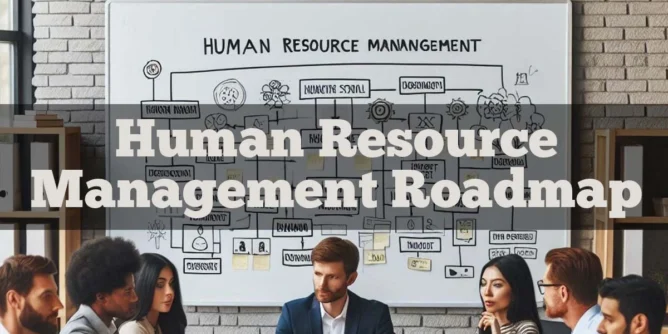
Introduction:
Human Resource Management (HRM) is a critical function in every organization, responsible for managing the most valuable asset—people. Whether you’re starting your HR journey or looking to grow in your career, a structured Human Resource Management roadmap will guide you in mastering the skills, processes, and strategies essential for success.
Step 1: Understand the Fundamentals of Human Resource Management
Begin with a clear understanding of HRM’s core principles and functions:
Recruitment and Selection: Attracting and hiring the best talent.
Training and Development: Enhancing employee skills and career growth.
Performance Management: Setting goals and evaluating employee performance.
Employee Relations: Building a positive work environment.
Tip: Take introductory courses or attend HR workshops to learn the basics.
Step 2: Pursue the Right Education
A solid educational foundation is vital for a successful HR career:
Earn a Bachelor’s Degree in Human Resources, Business Administration, or Psychology.
Consider advanced studies like a Master’s in HRM or an MBA with an HR focus.
Bonus: Many universities offer online HR programs for flexible learning.
Step 3: Gain Practical Experience
Hands-on experience is key to developing HR expertise:
Start with internships or entry-level HR roles such as HR Assistant or Recruitment Coordinator.
Learn to use HR management systems (HRMS) like Workday, BambooHR, or SAP SuccessFactors.
Volunteer for HR tasks like organizing employee engagement activities.
Step 4: Master HR Tools and Technologies
HR professionals must be tech-savvy to manage tasks efficiently:
Payroll Management Tools: ADP, QuickBooks
Recruitment Platforms: LinkedIn Recruiter, Taleo
Performance Management Tools: 15Five, Lattice
Learning Management Systems (LMS): Docebo, TalentLMS
Tip: Familiarity with analytics tools can give you an edge in data-driven decision-making.
Step 5: Develop Key HR Skills
Effective HR management relies on a mix of technical and interpersonal skills:
Communication: Foster clear and open dialogue with employees.
Conflict Resolution: Address workplace disputes diplomatically.
Leadership: Guide teams and influence organizational culture.
Data Analysis: Use metrics to improve HR strategies and outcomes.
Step 6: Obtain HR Certifications
Professional certifications validate your skills and open doors to senior roles:
SHRM-CP or SHRM-SCP (Society for Human Resource Management)
PHR or SPHR (Professional in Human Resources)
CIPD Certification (Chartered Institute of Personnel Development)
Bonus: Research the certification most relevant to your career goals and location.
Step 7: Stay Updated on HR Trends and Laws
HR is influenced by evolving workplace trends and legal frameworks:
Follow Industry Blogs: Subscribe to SHRM, HRCI, and Forbes HR.
Participate in Seminars: Learn about the latest HR technologies and best practices.
Understand Employment Laws: Familiarize yourself with local and international labor laws.
Step 8: Define Your HR Career Path
HR offers various specializations. Choose a path that aligns with your interests:
Talent Acquisition: Focus on recruiting and hiring.
Employee Engagement: Build workplace morale and satisfaction.
Compensation and Benefits: Manage salaries, perks, and rewards.
HR Analytics: Leverage data to optimize workforce management.
Step 9: Build Your HR Network
Networking is essential for career growth:
Join professional organizations like SHRM, CIPD, or local HR associations.
Attend HR conferences and webinars to connect with industry leaders.
Engage in online HR forums or LinkedIn groups.
Conclusion:
A career in Human Resource Management is both rewarding and impactful, as it involves shaping the success of individuals and organizations. By following this Human Resource Management roadmap, you’ll acquire the skills and knowledge needed to thrive in the HR field. Start your journey today and make a difference in the workplace!
